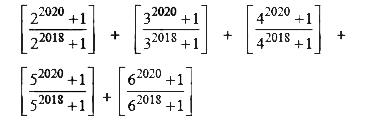If [x] denotes the greatest integer less than or equal to x for any real number x. Then, limx→∞[n√2]n is
A
0
B
2
C
√2
D
1
Text Solution
The correct Answer is:C
|
Similar Questions
Knowledge Check
Let [x] denote the greatest integer less than or equal to x for any real number x. then limx→∞[n√2]n is equal to
A0B2C√2D1Let [x] be the greatest integer less than or equal to x, for a real number x. Then the following sum

is-A80B85C90D95Let [x] be the greatest integer less than or equal to x, for a real number x. Then the equation [x2]=x+1 has
Atwo solutionsBone solutionCno solutionDmore than two solutions
If [x] denotes the greatest integer less than or equal to x,then the value of limx→1(1−x+[x−1]+[1−x]) is
View SolutionLet [x] be the greatest integer less than or equal to x, for a real number x. Then the equation [x2]=x+1 has
View SolutionLet [x] denotes the greatest integer less than or equal to x. If f(x)=[xsinπx], then f(x) is
View SolutionLet [x] denotes the greatest integer less than or equal to x. If f(x)=[xsinπx], then f(x) is
View SolutionLet [x] denote the greatest integer less than or equal to x. Then, ∫1.50[x]dx=?
View Solution
